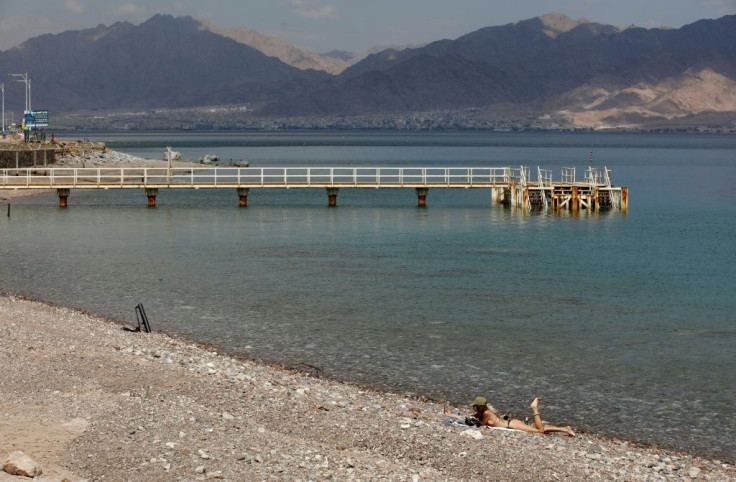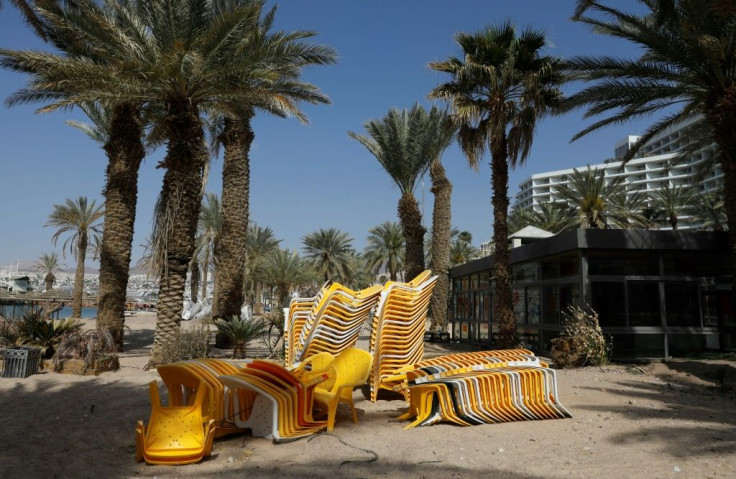Israel's Red Sea Resort 'Paralysed' By Virus Lockdown

In Israel's popular Red Sea resort of Eilat, carousel music from a shuttered amusement park echoes in the emptiness of a locked-down city robbed of its main livelihood by the coronavirus.
In a normal year around 2.5 million tourists visit the resort which lies on the narrow southern edge of Israel, wedged between Jordan and Egypt's Sinai peninsula.
They sunbathe on its golden beaches, dive in its crystal-clear waters, stroll along its promenade or cool off in the bars and pools of the hotels lining the seafront.
But with the onset of the COVID-19 pandemic Israel imposed a nationwide lockdown, closed its borders to travellers and shut down its leisure industry to fight the spread of infection.
Now it is hard to imagine that the city's 12,000 hotel rooms are usually all occupied for most of a normal year.
In the lobby of the huge five-star Dan Eilat hotel, the furniture was draped with dustsheets and the fountains were dry.
The vast spiral staircase was untrodden except by security staff, the only remainder of the 500 workers who normally keep the establishment running.
Lior Mucznik, director of this hotel and two others, estimates losing tens of millions of Israeli shekels (millions of dollars/euros) each month the pandemic continues.
On his cellphone he had images of damage wreaked by gales which swept the coast in mid-March. They show uprooted flowers and sand-encrusted terraces.
"After the storm, the coronavirus!" he said, adding that he has yet to receive any aid from the authorities.

The city of 67,000 has received government funds to respond to the virus but for the moment the aid is like a "plaster on a large wound," said mayor Meir Yitzhak Halevi.
Seventy-five percent of its residents are unemployed, he told AFP.
On Saturday, following a slowdown in the rate of new confirmed cases, the government announced the easing of some movement restrictions and the reopening of some businesses.
Halevi said the easing was "a first step" and that its "contribution to the city of Eilat is very minimal."

Israel, which has a population of around nine million, confirmed its first coronavirus patient on February 21.
Since then it has logged almost 14,000 cases -- around 20 in Eilat -- and about 181 deaths from the disease.
Municipal employee Nora Bitton said that for Eilat the economic emergency is far more severe than the health crisis.
City hall has therefore called on the government to draft a response plan specific to the Red Sea resort.
Starved of tourism, she said, "this little corner of paradise" has had its "oxygen tube cut".
"It's as if the city became paralysed," said Josef Gez, 54, taking a walk in defiance of the lockdown and risking a fine in the process.
Gez said he had walked from the far side of town down to the seafront for some fresh air and sunshine and was shocked by the lack of activity.
"In 32 years of living here I've never seen it like this," he told AFP.
"It's as if a bomb had dropped."
A little further along the beach a French couple who moved to Eilat a decade ago attempted to take a swim. As their feet touched the sand, they were promptly challenged by a police patrol.
Forced to abandon their excursion, the pair of retirees said they were "saddened" to see the city deserted at a time of the year when it is usually difficult to stake a place in the sun.
Leaning against a barrier surrounding one of his hotel's three pools, Mucznik said that the eight-day Passover Jewish holiday, which has just ended, is usually a mainstay of the local economy.
He said that during the festival the 375 rooms of the hotel are normally occupied at high rates.
"If we miss the second peak high season, from July to September, then it will be a catastrophic year," he said, before correcting himself.
"In fact, it's already a catastrophic year".
© Copyright AFP 2024. All rights reserved.




















